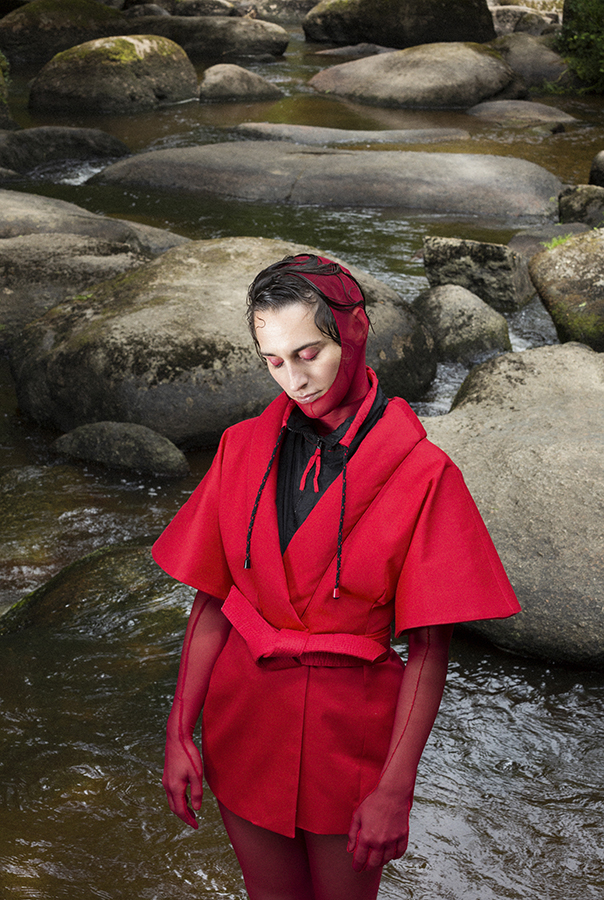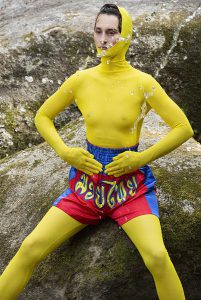INTERVIEW: Julie Budet on the more mature YELLE, ‘The Age of Aquarius’

YELLE, Courtesy: Jerome Lobato.
Julie Budet, one-half of French dance pop duo YELLE, points to the penultimate track on new album L’Ère du Verseau as one of numerous examples at the group’s more serious and mature direction.
L’Ère du Verseau
(The Age of Aquarius)
YELLE
Recreation Center, Sept. 4
“Peine de mort” translates to English as “death sentence.”
“We use it in, in the sense of sadness—sadness of losing someone, if you want,” says Budet, who also goes by Yelle, alongside her partner, producer Jean-François (GrandMarnier) Perrier. “It’s the story about someone who lost someone else, and you have the point of view of the person who left. We really like to have someone watching you living your life after losing someone and when you are in grief.”
Over an Eastern-sounding synth melody and electronic-yet-organic-sounding drum programming, she sings about needing someone who’s gone, and seeing him in minuscule everyday coincidences—”When you wake up in the morning, when you smell something, when you have a connection because you hear a song on the radio—
“We really like this point of thinking that the person you lost is probably watching you living your life. I really like that,” Budet says. “It’s like having two parallel worlds, and I think it’s cool to … think there is another state where people can have a good connection on you, good vision of what you are doing.”
Two years ago, Budet lost her father. She says she wasn’t ready to specifically address his passing on L’Ère du Verseau, which translates to The Age of Aquarius, but that she and GrandMarnier have explored death in more general terms in the past. It’s easier to process on those terms.
She says she’s always been somewhat melancholic in her songwriting, and nostalgic, but that the new album shows a darker side of herself because she herself has grown away from the youthful exuberance of the past. The state of the world and the state of her life—losing her father—has overwhelmed her at times. She says she became “a little bit more adult” when he passed.
“You are the next on the pattern, you know?” she says. “So you are not the child. You are now an adult. I’ve never felt something like that before. I think I was thinking I would be a child forever, and young. I became a little bit more aware of things and maybe sensitive or something. I was ready—we were ready—to express this kind of dark [part]. It’s not really dark. It’s a little bit gray.”
Before, when YELLE would approach mortality or other sadder themes, the duo would hide it behind danceable beats.
“It was cool to have this balance—but now we are ready to express more in this way,” Budet says. “We are maybe a little bit more conscious and maybe more mature.”
This outlook begins with the album title. To Budet and Perrier, the Age of Aquarius is a transitory period that course-corrects humanity away from the Pisces era—full of violence, chaos and power-hungry men—to a better place.
L’Ère du Verseau looks to find hope and the promise of a better future for everyone.
Julie Budet on the pause of culture in France
It’s hard because we can feel it. It’s summer, and there is no festivals. There is no clubs, there is no parties. There’s small events when there is a DJ, but you can’t really dance because you can’t stand [close to others]. It’s really weird. During the quarantine, it was crazy because you could go online to see the Louvre. You had access to things that you probably never used before. It was interesting to have this profusion of things to do. And of course there were lots of movies to watch and music to listen, books to read and everything, but it can’t last because you need to have a connection. In music, for example, it’s so important to have a connection with the band, to see them live. For museums, it’s great to go out of your house and to go somewhere else to discover a place.
During the quarantine, it was OK because we knew it would end at some point. Now it’s hard to have projections, because we don’t know when it’s going to be possible to go back to normal. It’s kind of disturbing.
But having the time to read, having the time to listen to podcasts, time to discover things; it probably helps in a way for people to connect with things that they were not aware of. This is a good thing, but maybe the only good thing.
“This is a new moment, a moment of love, of fraternity, of equality for people,” Budet says. “I really like this idea about going through something very hard but something good is going to come. Even if this album is maybe a little bit darker than the previous one, I think it’s because we grew up and we are maybe not naive anymore.”
The album is the group’s first in six years. During that time, the duo didn’t exactly take a break. It released a handful of one-off singles, started its own record label after leaving Dr. Luke’s Kemosabe Records following rape allegations against him, and also toured for two years. Budet also had time to focus on acting in films and TV and even took up playing the flute.
Running their own label is a crazy amount of work, but Budet says she and Perrier enjoy being involved in the minutia of the music business and be fully in control of their destiny. Once they would finish a song, they would be ready to film a video and post it online for fans right away. They also felt free to not have to write a complete story and to not be locked into the same mood with their songs for a while.
“At some point, we realized, ‘We have like nine or 10 songs. Actually, we have an album. Let’s do it,’” she says. “But we never thought, ‘We have to do another one now.’”
YELLE released its lead single from L’Ère du Verseau in April. Meditative piano-driven ballad, “Je t’aime encore,” which YELLE has described as being about a complicated long song to France, has Budet getting a haircut in real-time, but with a twist at the end. The video is a symbolic introduction of a new Budet, but one with her heart in the same place.
“I realized that it’s important; cutting your hair, when you change something in your life,” she says. “Sometimes it’s just a little change, but for me it’s something important, and I really like the idea about coming and having my hair cut; and actually being the same. … It’s like a rebirth, but it’s a rebirth of something that already exists.”
YELLE filmed the video for the second single, chant-led club banger “Karaté,” right after the COVID-19 lockdown ended in France. Partly because of existing restrictions on how many people could work together in confined spaces, the video was split into two locations.
Budet says the duo already knew it wanted the video to include different types of energy and mood.
In the first, spastic dancer Joris Wolfy Gangzi—of whom both Yelle and GrandMarnier are fans—dances to the music in a bleached studio. In the second, a costumed and calm Budet sings from a large stone in the middle of the Gouët River in Brittany, the region in which she grew up.
“We actually already had this idea about having two different spaces and to have … something really static and something really crazy, and a lot of dance,” Budet says. “It was really important for me to have the link with the water, and particularly this river, because I grew up just above this forest. It was really important for me to have this connection with my childhood. I just wanted to show it to people, in a way.”
Although Budet doesn’t sing in English, YELLE has a strong following in the U.S. She says she doesn’t know for sure why that is, and credits luck as well the duo’s energetic live shows and the internet, which makes translating lyrics easier. The group got its start in 2005, at the height of MySpace, which made the dissemination of its music easier.
She won’t take credit—“I’m sure there were other French artists”—but YELLE paved the way for other French pop acts like Christine and the Queens to find mainstream success here.
The duo was dead set on releasing L’Ère du Verseau in 2020, despite the pandemic, because it felt a duty to its fans during a difficult time. It hopes to tour in the U.S. in January. If that won’t be possible, Budet and Perrier will have to think of another way to connect with people.
“As artists, we realized that it’s our job to entertain people, in a way, and to give them things to listen to and things to feed them,” she says.
Follow editor Roman Gokhman at Twitter.com/RomiTheWriter.

